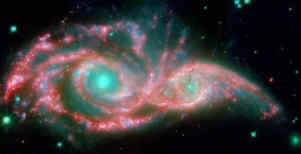What is Infinity?

| Infinity ... | |
| ... it's not big ... | |
| ... it's not huge ... | |
| ... it's not tremendously large ... | |
| ... it's not extremely humongously enormous ... | |
| ... it's ... |
Infinity has no end
Infinity is the idea of something that has no end.
In our world we don't have anything like it. So we imagine traveling on and on, trying hard to get there, but that's not actually infinity.
So don't think like that (it just hurts your brain!). Just think "endless", or "boundless".
If there's no reason something should stop, then it is infinite.
Infinity doesn't grow
Infinity isn't "getting larger", it is already fully formed.
Sometimes people (including me) say it "goes on and on" which sounds like it is growing somehow. But infinity doesn't do anything, it just is.
Infinity isn't a real number

Infinity isn't a real number, it is an idea. An idea of something without an end.
Infinity can't be measured.
Even these faraway galaxies can't compete with infinity.
Infinity is Simple
Yes! It is actually simpler than things which do have an end. Because when something has an end, we have to define where that end is.
Example: in Geometry a Line has infinite length.
A Line goes in both directions without end.
When there's one end it is called a Ray, and when there are two ends it is called a Line Segment, but they need extra information to define where the ends are.
So a Line is actually simpler then a Ray or Line Segment.
More Examples: |
|
|
{1, 2, 3, ...} |
The sequence of natural numbers never ends, and is infinite. |
|
OK, 1/3 is a finite number (it isn't infinite). But written as a decimal number the digit 3 repeats forever (we say "0.3 repeating"): 0.3333333... (and so on) There's no reason why the 3s should ever stop: they repeat infinitely. |
|
| 0.999... |
So, when we see a number like "0.999..." (i.e. a decimal number with an infinite series of 9s), there's no end to the number of 9s. You can't say "but what happens if it ends in an 8?", because it simply doesn't end. (This is why 0.999... equals 1). |
| AAAA... |
An infinite series of "A"s followed by a "B" will NEVER have a "B". |
| There are infinite points in a line. Even a short line segment has infinite points. | |
Big Numbers
There are some really impressively big numbers.
A Googol is 1 followed by one hundred zeros (10100) :
10,000,000,000,000,000,000,000,000,000,000,000,
000,000,000,000,000,000,000,000,000,000,000,
000,000,000,000,000,000,000,000,000,000,000
A Googol is already bigger than the number of elementary particles in the known Universe, but then there's the Googolplex. It is 1 followed by Googol zeros. I can't even write down the number, because there's not enough matter in the observable universe to form all the zeros:
10,000,000,000,000,000,000,000,000,000,000,000,000, ... (Googol number of Zeros)
And there are even larger numbers that need to use "Power Towers" to write them down.
For example, a Googolplex can be written as this power tower: ![]()
That's ten to the power of (10 to the power of 100),
But imagine an even bigger number like ![]() (which is a Googolplexian).
(which is a Googolplexian).
And we can easily create much larger numbers than those!
Finite
All of these numbers are "finite", we could eventually "get there".
But none of these numbers are even close to infinity. Because they are finite, and infinity is ... not finite!
Using Infinity
We can sometimes use infinity like it is a number, but infinity doesn't behave like a real number.
To help you understand, think "endless" whenever you see the "∞":
Example: ∞ + 1 = ∞
It says when something is endless, we can add 1 and it is still endless.
But be careful with ∞ in equations!
Let's try to subtract ∞ from both sides:
Oh no! Something is wrong here.
In fact ∞ − ∞ is undefined.

To avoid such mistakes:
Just imagine every ∞ is different.
We don't know how big infinity is, so we can't say two infinities are the same:
Example: Even Numbers
The set of natural numbers {1, 2, 3, ...} can be matched one-to-one with the set of even numbers {2, 4, 6, ...} like this:
Both sets are infinite (endless), but one seems to be twice as big as the other!
Properties
The most important thing about infinity is that:
−∞ < x < ∞
Where x is a real number
Which is mathematical shorthand for
"negative infinity is less than any real number,
and infinity is greater than any real number"
Here are some more properties:
| Special Properties of Infinity |
|---|
| ∞ + ∞ = ∞ |
| −∞ + −∞ = −∞ |
| ∞ × ∞ = ∞ |
| −∞ × −∞ = ∞ |
| −∞ × ∞ = −∞ |
| x + ∞ = ∞ |
| x + (−∞) = −∞ |
| x - ∞ = −∞ |
| x − (−∞) = ∞ |
| For x>0 : |
| x × ∞ = ∞ |
| x × (−∞) = -∞ |
| For x<0 : |
| x × ∞ = -∞ |
| x × (−∞) = ∞ |
Undefined Operations
All of these operations are undefined.
In Calculus they are indeterminate because we can't determine the result, see limits to learn more.
| "Undefined" Operations |
|---|
| 0 × ∞ |
| 0 × −∞ |
| ∞ + −∞ |
| ∞ − ∞ |
| ∞ / ∞ |
| ∞0 |
| 1∞ |
Example: Is ∞∞ equal to 1?
No, because we can't say that two infinities are the same.
How about this:
And that doesn't make sense!
So we say that ∞∞ is undefined.

Infinite Sets
Digging deeper into this subject reveals the idea of different sizes of infinity like ℵ0 (aleph-null), ℵ1 (aleph-one) and the Continuum.
Read Countable Sets to discover more.
Conclusion
Infinity is a simple idea: "endless". Most things we know have an end, but infinity doesn't.

